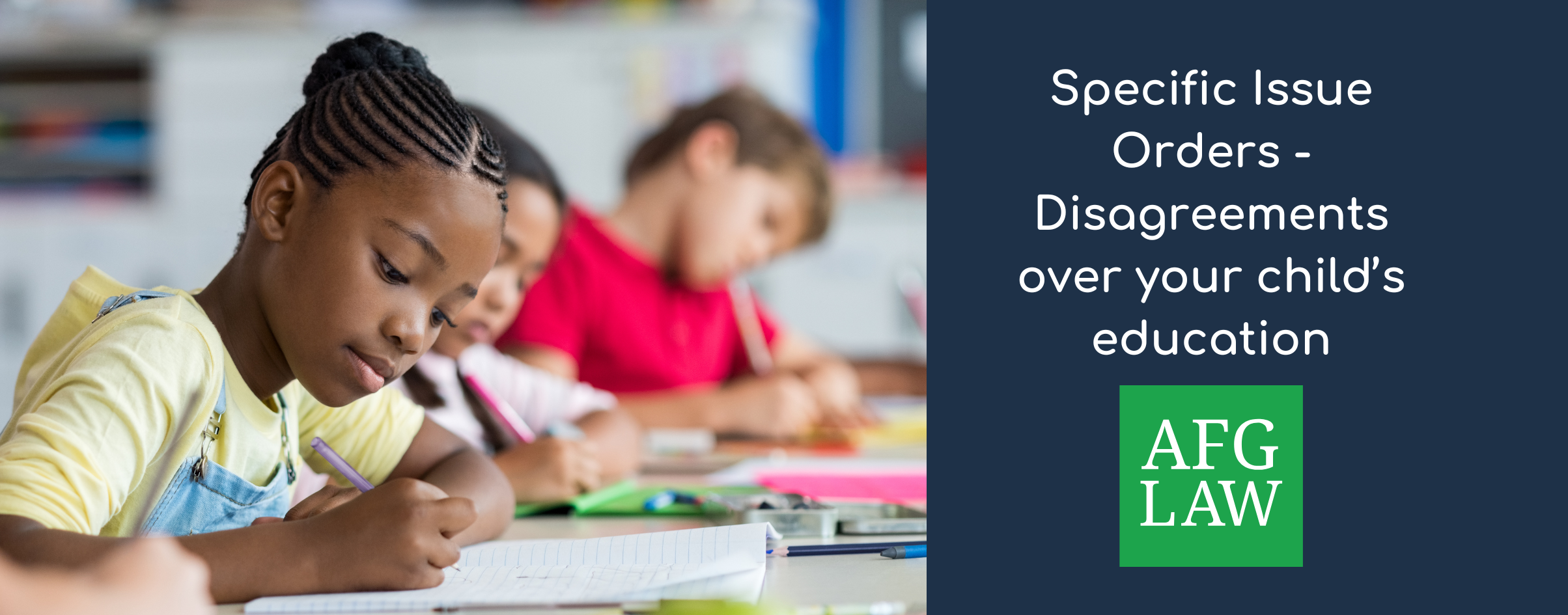As the six-week school holidays begin this month, many parents will already be considering their child(ren)’s education for the next year. It may be time to start school or nursery, or change schools by the time September comes, but what do you do if there is an absence in agreement with your former partner over which school to send your child? Or with someone else who may hold parental responsibility?
When parents separate, divorce or dissolve of a civil partnership, matters can intensify and can impact family relationships, such as the choice of school, which is why it is important to seek legal help to ensure the decision made is one in the best interests of your child(ren).
As a leading law firm which specialises in Private Children Matters, AFG LAW, with offices in Bolton, Bury and Stockport, has helped many families with the practical steps that can be put in place to support a family when dealing with a specific issue.
First, we must establish who has parental responsibility:
- Mothers of the child(ren) have automatic parental responsibility.
- A father will have parental responsibility if:
- He is married to the mother.
- He is named on the birth certificate.
- He has an order from the court granting parental responsibility.
- Or if he has a written agreement with the mother granting parental responsibility.
- Civil partners will both have parental responsibility if they were married at the time of their treatment. E.g. fertility treatment.
- For same sex partners who are not civil partners you can obtain parental responsibility by either entering into a parental responsibility agreement or by applying to the court for a parental responsibility order.
Everyone with parental responsibility has a say when making decisions that effects their child(ren)’s education as well as other significant decisions. It is easy for conflict to arise with those who share parental responsibility and deciding where your child(ren) should go to school. The involving factors could be financial, religion, location, amongst many more reasons.
What are your options in the absence of an agreement?
Those with parental responsibility will need to try mediation (a Mediation Information and Assessment Meeting, or MIAM) before taking this to court, although there are some exemptions to this. Mediation takes place in a neutral setting and allows you to discuss your reasons for the choice of school with someone neutral known as the mediator to try and help you reach a decision. The mediator may involve your child(ren) depending on their age so they can put forward their feelings and preferences as it is always in the best interests of your child(ren).
However, if an agreement cannot be reached through mediation, you may want to seek legal advice at the earliest opportunity to make an application for a specific issue order to the family court in which, they will make a decision for you in respect of which school your child should attend.
The decision made by the court is based on the best interests of your child(ren). The court will consider their age, sex, background, physical, emotional, and educational needs as well as any other child(ren) specific needs. The court will also consider the practicality of the school for example the location of the school, how will they travel to and from the school? Are there any agreed child arrangements in place that could be affected? Ultimately, your child(ren)’s education is critical, so all options will be carefully considered to ensure the best interests of your child(ren) are met.
You can find more information about specific issue orders and what to expect in a specific issue order hearing here: https://www.afglaw.co.uk/family-law/children-on-relationship-breakdown/specific-issue-orders/
What exemptions are there to having to attend a MIAM?
Exemptions to attending a Mediation Information and Assessment Meeting can be relied on for a small range of reasons:
- If there is evidence of domestic abuse
- If there are child protection concerns
- If the application for a Specific Issue Order must be made urgently.
How can AFG help with Specific Issue Orders?
This may feel like a very unsettling time for you and you may feel rather helpless or frustrated yet there may be practical things that you can do to help everyone involved in the long run:
- Be open to mediation.
- Seek legal advice.
- Document your discussions with those involved, whether that be your child, ex-partner, and or schools.
- Listen to your child’s thoughts and feelings.
- Ensure you have considered all your options and schools in your area.
If you find that you are experiencing this, please do not hesitate to contact AFG Law. We are here to help you and your family so get in touch with one of our team for an initial chat.
Get in touch
Contact us by emailing familysolicitor@afglaw.co.uk or calling 01204 377600 for further information or assistance.
AFG Law is a long established, multi-disciplinary law firm providing a range of services across the North West and beyond. It is built on traditional foundations combined with modern values and a fresh, forward-thinking approach.
Our family team can assist on a wide range of matters, including representation in divorce, child contact and residence, child protection cases and domestic violence cases. The team is committed to dealing with all disputes in the family in a constructive and compassion way, focussing on preserving dignity and encouraging mutual agreements.
